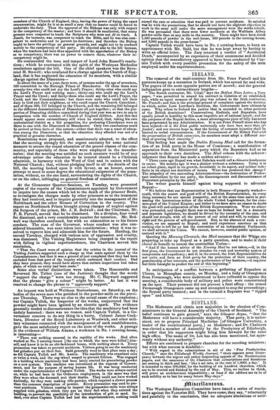IRELAND.
The removal of the mail-contract from Mr. Peter Purcell and his partners keeps up a sensation in Ireland, which has spread far and wide. The papers of the most opposite parties are of accord ; and the general indignation goes to extraordinary lengths- " The Scotch contractor, Mr. Croal," says the Belfast News Letter, a Tory paper, " was permitted to amend his contract in violation of an established rule, while an equal measure of fair play was refused to the Irish contractor, Mr. Purcell; and this is the principal ground of complaint against the decision to which, under Lord Lowther's direction, the Government have ultimately come. Why refuse to Ireland the justice that is accorded to othor portions of the British dominions? Conservatives, Radicals, and Repealers, have equally joined in hostility to this most impolitic act of national insult ; and for the purposes of the Repeal faction, a more advantageous piece of folly has never been perpetrated by any Administration. It is not Peter Purcell alone who has been injured—it is the Irish public universally who have been more than of- fended ; and our sincere hope is, that the feeling of common injustice shall be limited to verbal remonstrances. If the Government of Sir Robert Peel wish the preservation of British connexion, its members must adopt a different me- thod of proving their sincerity."
This feeling has made the Dublin Evening Mail call for the forma- tion of an Irish party in the House of Commons ; a manifestation of separation from the Ministerial party which the Repealers bail as an approach to their own doctrines. The Mail echoes with the acknow- ledgment that Repeal has made a sudden advance-
" Three years ago Repeal was what Rabelais would calls chimecra bombynans in vacua. Six months ago it was a shadow without a substance. Today it is an infant giant, rapid in its growth, formidable in its aspect, and neither inde- finite in its object nor destitute of means. What has produced this change ? The mispolicy of two succeeding Administrations—the destruction of Protes- tant institutions by the one party, the discouragement and discountenance of Protestant principles by the other." The writer guards himself against being supposed to advocate Repeal- " We believe that our Representation in both Houses—if properly worked— could, with the assent and good-will of the British Representation, do every thing necessary for our special prosperity, and at the same time assist in pro- moting the harmonious action of the whole United Legislature, for the com- mon good of the United Empire; and hither to we have seen no reason to doubt the good-will and cooperation of the British Representatives. Were we other- wise persuaded, and thought there was no hope for Ireland but in a domestic and separate legislation, we should be driven by the necessity of the case, and should not scruple, with all the powers of our mind and will, to reclaim the right and the powers of self-government. But, in the absence of such a con- viction, we are opposed to Repeal; and until experience convince us that nothing else is left for us but the restoration of an independent Parliament, we shall advocate the Union. We cannot, however, control public opinion, or contend with it."
Quoting the Morning Chronicle, the Mail assumes that the Whigs are preparing to take up Repeal as a party question, and to make it their cheval de bataille to unseat the unsteadfast Tories-
" And if the honest advice of the Evening Mail be not taken,—if, in the first place, the Government do not abandon its weak and unworthy system of compromise and expediency ; and if, in the second, the Irish Representatives do not unite and form an Irish party for the protection of their country, the guardianship of her intereste, and the performance of her business,—it requires but little foresight to predict the end of this beginning."
In anticipation of a conflict between a gathering of Repealers at Clones, in Monaghan county, on Monday, and a body of Orangemen from Fermanagh, who were understood to have collected to oppose the meeting, a considerable body of military and police were concentrated oa the spot. Their presence did not prevent a fatal affray : the armed Fermanagh Orangemen came up and attempted to stop the proceedings ; the Repeal party resisted ; and in the turmoil a Repealer was "ripped open" and killed.


























 Previous page
Previous page